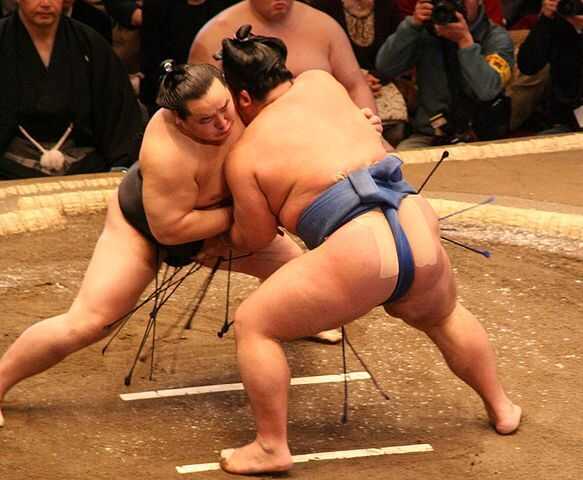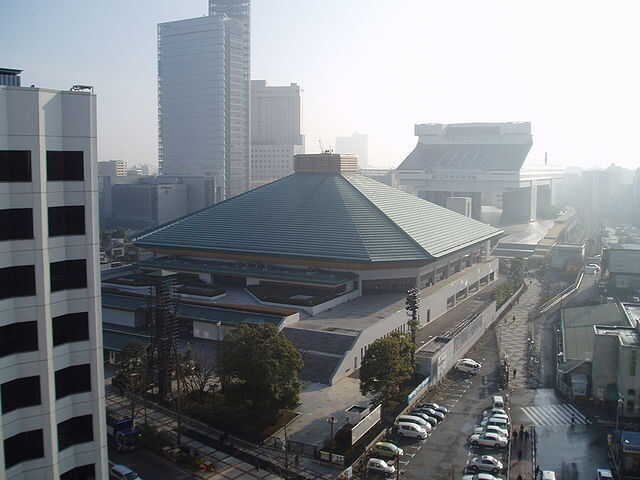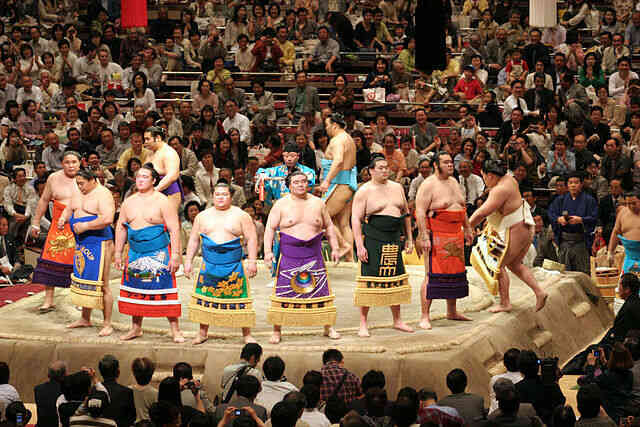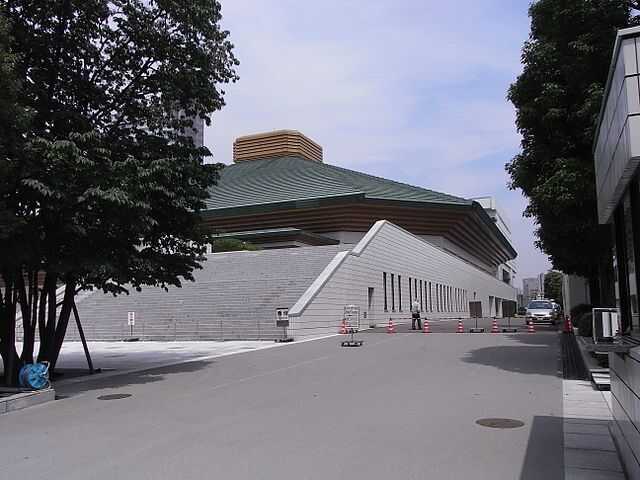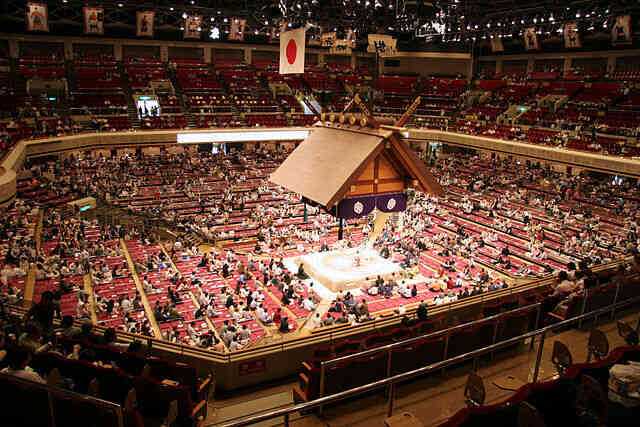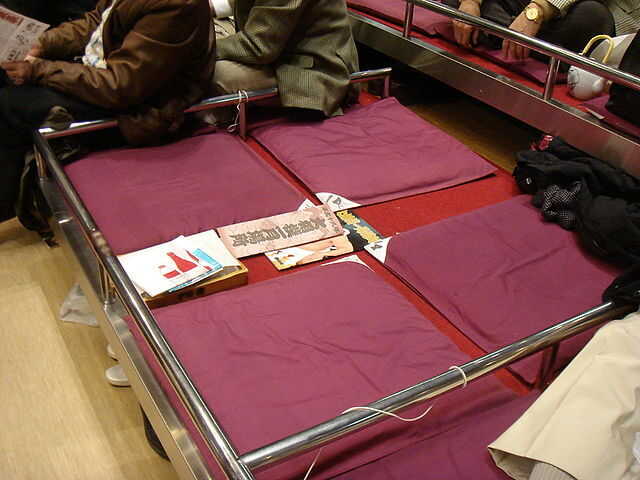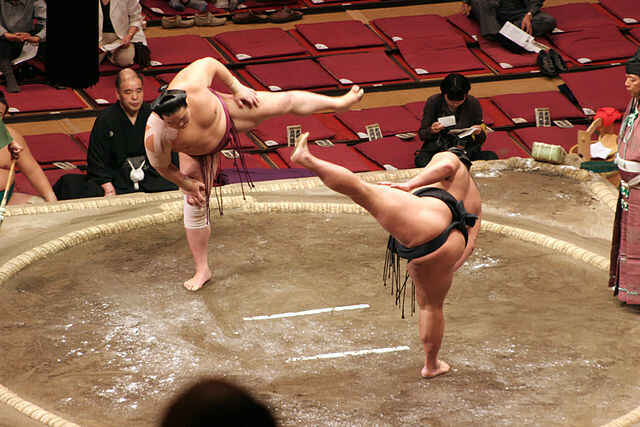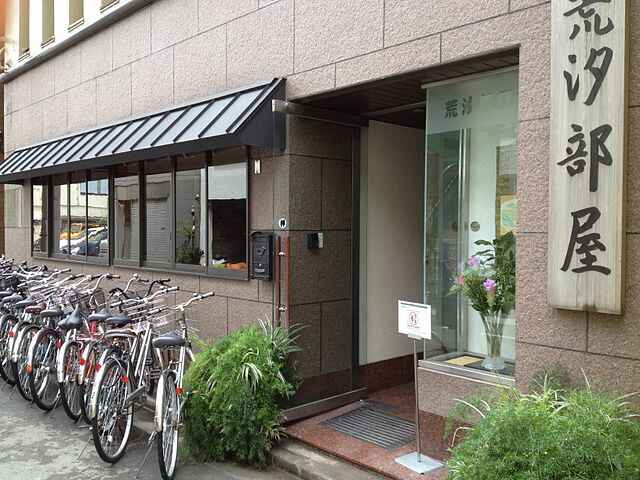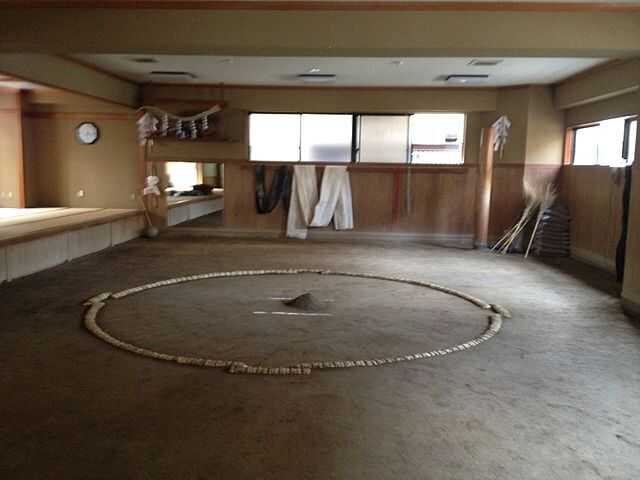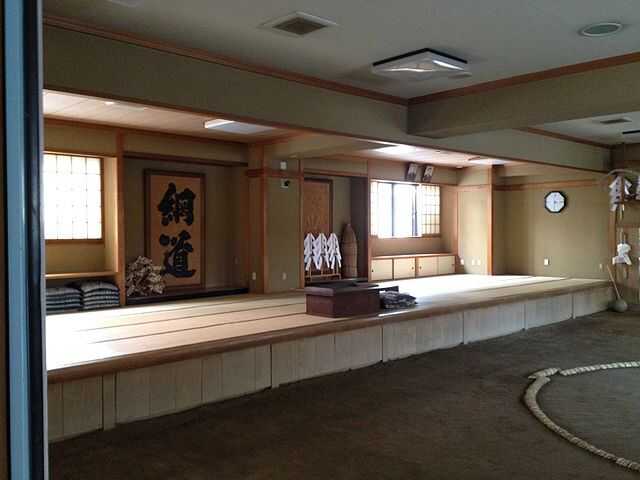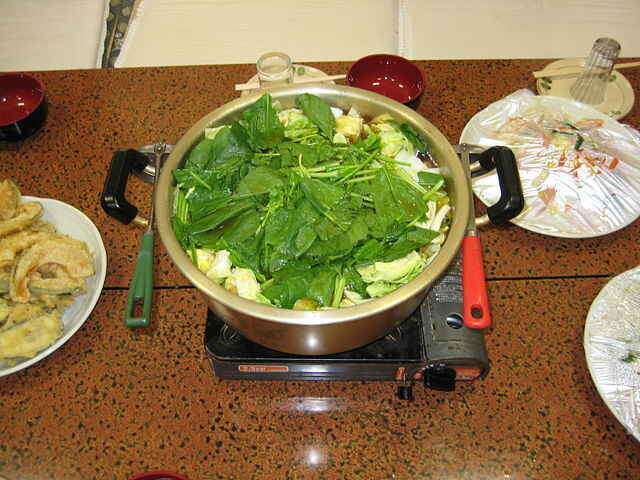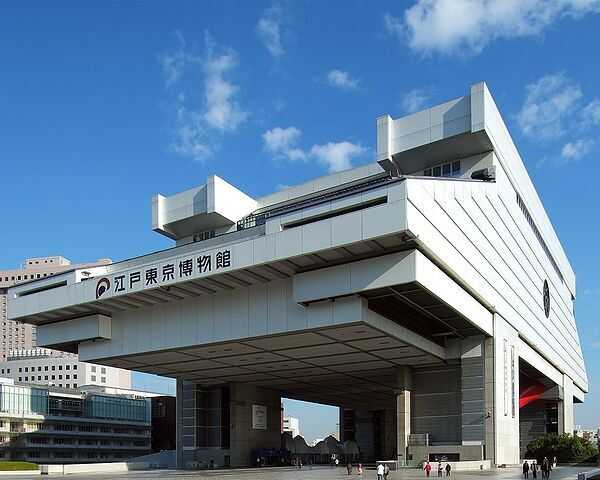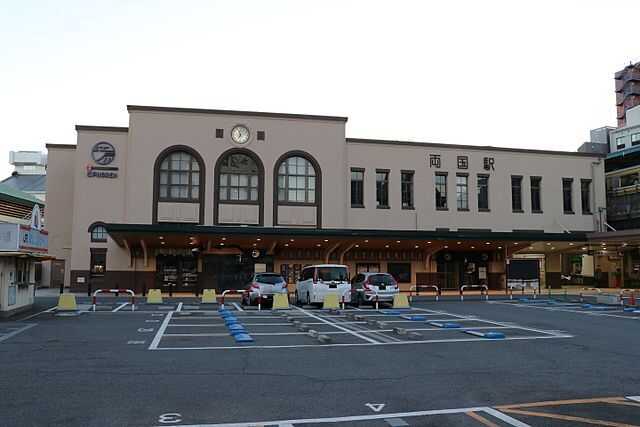|
The Ryogoku neighborhood, in the southwest portion of the Sumida Ward in Tokyo, is nearly synonymous with Sumo, the Japanese style of wrestling.
Sumo is one of Japan's most famous sports, where the two giant wrestlers grapple and attempt to hoist each other out of the ring. The rules are easy to follow: a wrestler loses if any part of his body besides the soles of his feet touches the ground, or exit the ring "Dohyo" first. There are no weight restrictions or classes in professional sumo, and considering the range of body weights in sumo, an individual wrestler can sometimes face an opponent twice his own weight. |
|
Ryogoku, the heartland of professional sumo, is home to the Sumo Stadium, many Sumo Stables and Chanko restaurants.
The growing popularity of Sumo during the Meiji period led to the building of the original sumo hall in Ryogoku area in 1909. The present Ryogoku Kokugikan "Sumo Stadium" was opened in 1985 and it seats over 10,000 visitors and hosts three of the six annual sumo tournaments "in January, May and September". The other three are held in three other cities; one in Osaka "March", one in Nagoya "July" and one in Fukuoka "November". |
|
These tournaments last for 15 days, and are filled with ceremony and ritual which observe strict hierarchies not just for the wrestlers, but also for the referees and callers.
The competition each day begins around 9:00 in the morning with the amateurs, and from there, wrestlers compete in progressing order of seniority. English pamphlets describing the day's program and sumo in general are available, and radios with live English commentary can be rented. |
|
A shop and a small sumo museum tucked inside the arena's first floor are open to visitors.
The Museum is dedicated to the history of sumo, particularly artifacts and ceremonial clothing. The collection rotates several times a year. During sumo tournaments they are only accessible to tournament ticket holders. Tickets can be purchased in advance through the official vendor or via buysumotickets.com. Tickets can also be purchased directly at the stadium, or at convenience stores; some Japanese language skills required. |
|
If you want to buy the ticket at the stadium you need to show up at the Kokugikan stadium at 6 a.m. or earlier. Sometimes even at 6 you might find some sleepy-looking souls already in line. The ticket gate opens at 7 a.m.
If you would like to reserve Sumo tournament tickets in advance, JTB group sells tour packages to Tokyo's three Sumo tournaments, which currently includes a tour of the Sumo Museum and a second floor reserved seat to watch the afternoon Sumo matches. The Kokugikan has both Western-style seats typically found in an arena and Japanese-style floor box seats. |
|
There are three types of seats available to regular visitors.
Ringside Floor Seats - These seats are the closest to the ring, most expensive and difficult to get. The seats are actually cushions on the floor. Sitting that close to the ring comes with its risk of injuries as sometimes wrestlers are flying into the spectators. Box Floor Seats - The rest of the stadium's first floor consists of box seats. Box seats are Japanese style seating in which spectators remove their shoes and sit on a cushion on the floor. The standard box seat is for 4 people and you need to pay per box - not per person. According to the distance from the ring, the box seats are classified into A, B and C boxes. |
|
Arena-Style Seats – There are several rows of Western-style seats on the second floor balcony. The balcony seats are also classified into A, B and C seats depending on distance from the ring.
In addition, there is one section called "arena-style general admission seats". These seats are for exclusive use by holders of same-day tickets. They are the cheapest ticket type and are available only at the Kokugikan Box Office on the tournament days. |
|
Sumo Stable "Heya", an organization of sumo wrestlers is where wrestlers live and train. All wrestlers in professional sumo must belong to one. Currently there are 45 active stables "as of April 2017", which many of them are located in the Ryogoku area.
It is said that one of the best cultural experiences you can have in Japan is seeing Sumo in action. One way is to get a ticket and watch a Sumo tournament. But not many think of attending the morning training session known as asageiko, which can be the best way to experience it up close and personal. At some stables like Arashio, it is possible to see the sumo practice in the early morning hours. |
|
The time training starts will vary from stable to stable, often beginning around 06:00 – 07:00 and lasting approximately 3 hours.
The proper way to attend would be to arrive arrive towards the beginning of practice and stay for the whole time. People who like to attend the Sumo practice should follow a few basic rules of etiquette when visiting a stable. When entering and leaving the stable, to bow to the stable master or the senior who is leading the practice, and also to the wrestlers. |
|
When sitting and watching, many Stables will offer a cushion called a Zabuton. You don’t have to sit on your knees in the traditional style; cross-legged or with your legs to the side would be fine – but try not to point to soles of your feet towards the ring where wrestlers fight.
You should refrain from taking photos, eating and drinking, and observe all practice sessions in silence. Smoking is, of course, another activity to avoid even if stable masters partake. Generally advance arrangements will be necessary, preferably with the help of a Japanese speaker. Contact information and the best dates to visit can be obtained by mail from the staff of Sumo Fan Magazine. |
|
Chanko Nabe is a Japanese stew commonly eaten in vast quantity by sumo wrestlers as part of a weight-gain diet.
It is a hot pot dish that comes in many varieties and contains fresh vegetables, meat, seafood, tofu, and noodles. Chanko Nabe is also a popular restaurant food, often served in restaurants operated by retired sumo wrestlers who specialize in the dish. There are several restaurants in the Ryogoku area that feature Chanko Nabe on their menus. |
|
Edo-Tokyo Museum is just around the corner from the sumo stadium.
This multi-story edifice suspended in midair, through numerous models of towns, figurines, life-sized figures and many other exhibits covers the history of the metropolis, starting from 1590 when it was selected as Japan's new capital Edo. Free informative tours are available in Japanese, English, Chinese, Korean, French, German and Spanish, depending on which volunteers are around. Audio guides also in several languages are always available. Admission fees vary. |
Ryogoku Kokugikan AccessTake the JR Sobu Line or Oedo Subway Line to Ryogoku Station. The sumo hall is two minutes’ walk from the station.
Tokyo SkyTree the world's tallest self-supporting tower is about twenty minutes’ train rid from Ryogoku Station. |
Ryogoku Muslim Friendly AccommodationHere as you see, there are few Muslim friendly hotels in Ryogoku Kokugikan neighborhood. Once you click on any of the hotels, you will be redirected to an online booking website where you can make your reservation.
There are more Muslim friendly hotels in Tokyo listed on our website. For booking random hotels you can search with Hotels.com, or the Hotel Map below which shows hotel prices and location on the map. There are Vacation Rentals in the area which suit travelers who prefer to rent a living space, especially for larger groups, families or those who seek a more local, everyday life experience. If you are traveling light and looking for a more economical place to stay Hostels are a good option. For booking a rental car use the search engine below. Fill out the details; pickup and drop-off places, date and time, and press search. You will be redirected to Rental Cars website where a list of available cars will be shown to you to choose from. |
|
|
|
Ryogoku Kokugikan - Sumida-ku, Tokyo
Sources
- Ryogoku Kokugikan - Top
- Sumo Wrestlers
- Kokugikan Sumo Stadium
- Dohyo-Iri - Ring Entering Ceremony
- Kokugikan Sumo Stadium
- Inside The Kokugikan Stadium In Tokyo
- Box Floor Seats At The Kokugikan
- Ringside Floor Seats
- Arashio Stable
- Fujishima Stable
- Fujishima Stable - Visitors' Sitting Area
- Chanko Nabe
- Edo-Tokyo Museum
- Ryogoku Station

